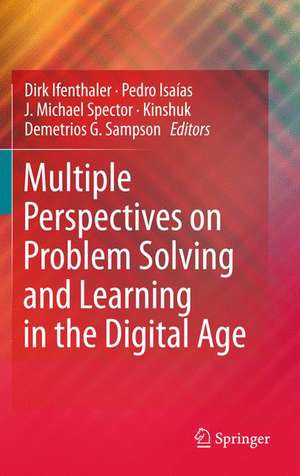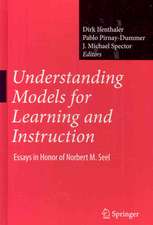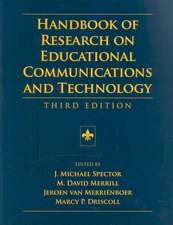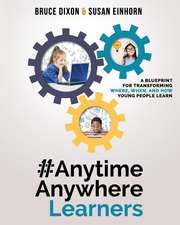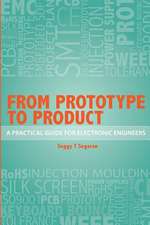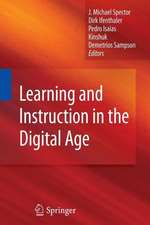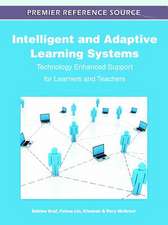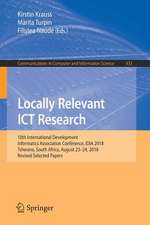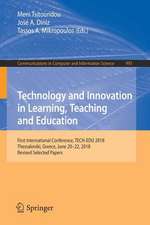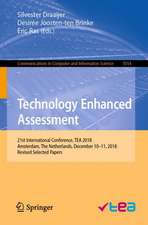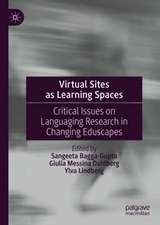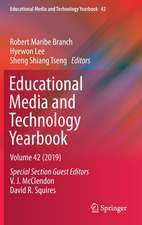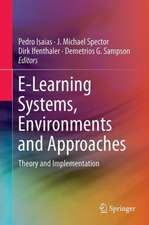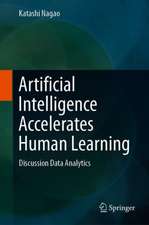Multiple Perspectives on Problem Solving and Learning in the Digital Age
Editat de Dirk Ifenthaler, J. Michael Spector, Kinshuk, Pedro Isaias, Demetrios G. Sampsonen Limba Engleză Hardback – 24 noi 2010
| Toate formatele și edițiile | Preț | Express |
|---|---|---|
| Paperback (1) | 646.43 lei 6-8 săpt. | |
| Springer – 8 oct 2014 | 646.43 lei 6-8 săpt. | |
| Hardback (1) | 652.81 lei 6-8 săpt. | |
| Springer – 24 noi 2010 | 652.81 lei 6-8 săpt. |
Preț: 652.81 lei
Preț vechi: 768.01 lei
-15% Nou
Puncte Express: 979
Preț estimativ în valută:
124.91€ • 130.77$ • 103.36£
124.91€ • 130.77$ • 103.36£
Carte tipărită la comandă
Livrare economică 05-19 aprilie
Preluare comenzi: 021 569.72.76
Specificații
ISBN-13: 9781441976116
ISBN-10: 1441976116
Pagini: 350
Ilustrații: XIX, 398 p.
Dimensiuni: 155 x 235 x 32 mm
Greutate: 0.76 kg
Ediția:2011
Editura: Springer
Colecția Springer
Locul publicării:New York, NY, United States
ISBN-10: 1441976116
Pagini: 350
Ilustrații: XIX, 398 p.
Dimensiuni: 155 x 235 x 32 mm
Greutate: 0.76 kg
Ediția:2011
Editura: Springer
Colecția Springer
Locul publicării:New York, NY, United States
Public țintă
ResearchCuprins
Investigating an online museum’s information system.- A framework for matching aims, processes, learner expertise and technologies.- Web-based learning objects in school education.- A monitoring and experience sharing tool.– Constructing a knowledge base according to a text comprehension model.- First-person education and the nature of knowing, understanding, and affect.- Socio-cognitive regulation strategies in cooperative learning tasks in virtual contexts.- Collaborative cognitive tools for shared representations.- Automating the measurement of critical thinking for individuals particIpating in discussion forums.- Alternative assessment strategies for complex problem solving in game-based learning environments.- Concept map based intelligent knowledge assessment system: experience of development and practical use.- Technologies to support the assessment of complex learning in capstone units: Two case studies.- Text-guided automated self.- Comparing the impact of electronic performance support and web-based training.- Moving beyond teaching and learning into a human development paradigm.- Leaders for the 21st century: Preparation, experiences, and roles in technology implementation.- Pedagogy and content knowledge based podcasting project for preservice teachers.- Simulation game as a learning experience: An analysis of learning style and attitude.- Implementation of an online social annotation tool in a college english course.- Self-direction indicators for evaluating the design-based elearning course with social software.- Employing virtual collaborative exchanges to expand global awareness.- Ideas and concepts of ViCaDiS – A virtual learning environment for digital students.
Textul de pe ultima copertă
Multiple Perspectives on Problem-Solving and Learning in the Digital AgeDirk Ifenthaler, Kinshuk, Pedro Isaias, Demetrios G. Sampson, J. Michael Spector, editorsHave computers made problem-solving easier? The answer is a resounding yes and no: while we can access more information and increasingly sophisticated search engines, problems themselves are more complicated, and often more vague. Accordingly, new strategies for teaching problem-solving should be technologically astute, engage learners, and encourage progressive development of skills. The perspectives represented in Multiple Perspectives on Problem-Solving and Learning in the Digital Age include instructional design, cognition, assessment, schooling/teaching, and virtual environments, with emphasis on technologies that not only promote problem-solving, but also address new problems created by rapidly changing technology. Innovative new tools such as MAPLET (a learner-focused framework for integrating technology into curricula), the virtual learning environment ViCaDiS, and interactive online museum exhibits demonstrate the complex nature of problem-solving and the diverse ways in which learners—and instructors—achieve expertise. A sampling of the topics covered:•Pedagogical usability issues in Web-based learning objects.•Collaborative cognitive tools for shared representation.•Automated measurement of critical thinking for discussion forum participants.•Expanding global awareness with virtual collaboration.•Simulation games as learning experience.•Beyond teaching and learning: the human development paradigm.Multiple Perspectives on Problem-Solving and Learning in the Digital Age re-draws the boundaries of curriculum design and distributed knowledge. This volume will be a welcome addition to education libraries, and a forward-looking reference for academics and professionals in the field of technology integration in learning and instruction.
Caracteristici
Represents the latest work in the area where problem-solving, information and communications technology, learning psychology and instructional design intersect Contributions and participation from cognitive psychologists, information technologists and instructional designers – both researchers and practitioners Volume covers technological as well as pedagogical issues related to developments in the field Includes supplementary material: sn.pub/extras
